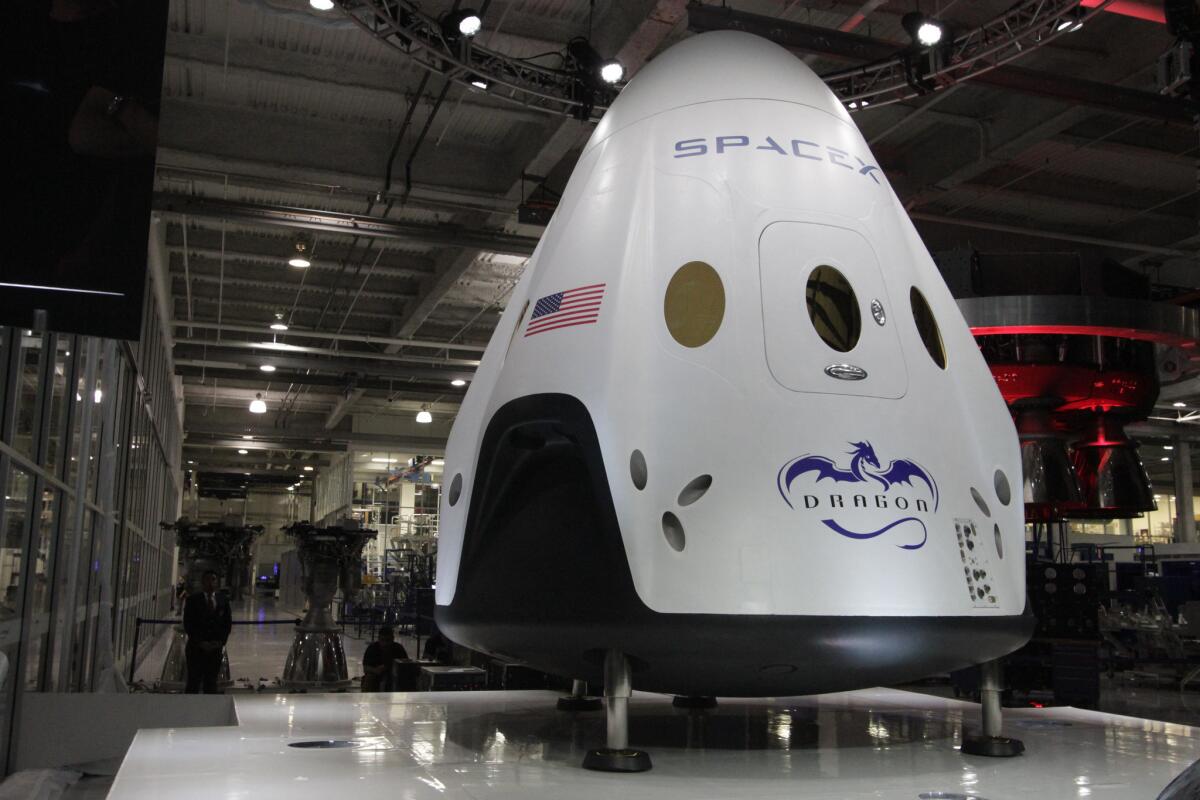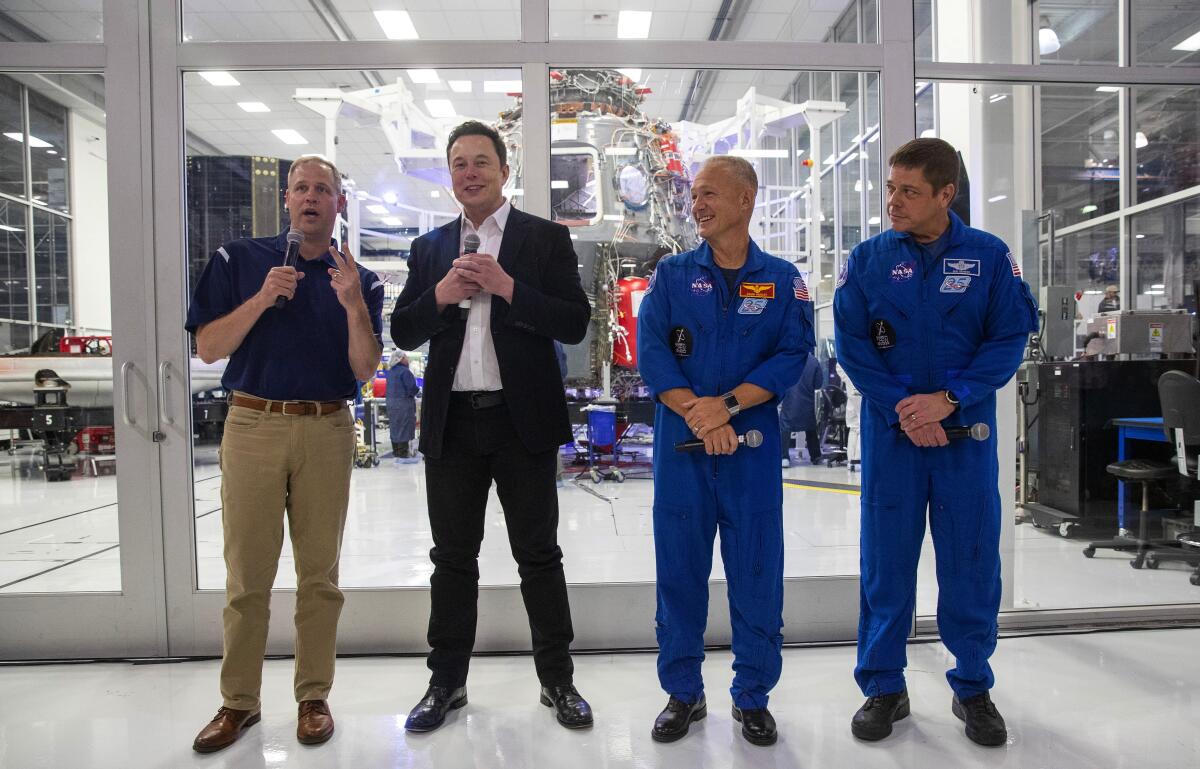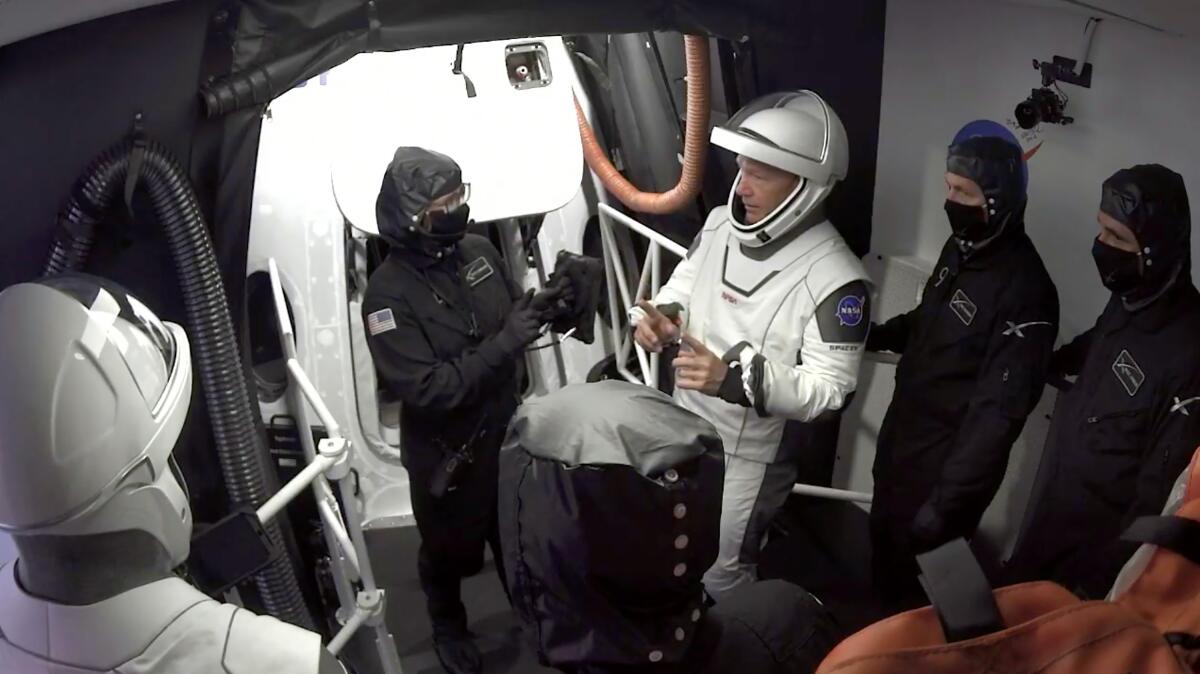- Share via
Live video of the NASA SpaceX launch

- Share via
Watch: President Trump speaks at Kennedy Space Center
(Required)
- Share via
Next stop: International Space Station
Crew Dragon has separated from the second stage of the SpaceX Falcon 9 rocket, en route to the International Space Station.
- Share via
Booster landing
- Share via
First stage of SpaceX Falcon 9 rocket returns to Earth
The first stage of SpaceX’s Falcon 9 rocket successfully landed on a floating platform in the Atlantic Ocean about 9 minutes after liftoff.
- Share via
Stage separation complete
The first stage of the rocket is heading back to Earth to land, while the second stage will propel the capsule containing Bob Behnken and Doug Hurley.
- Share via
And they’re off
(Required)
- Share via
Under a minute to go
- Share via
Minutes away
(Required)
- Share via
A send-off to the crew from SpaceX
“Bob, Doug, on behalf of the entire SpaceX team, it’s been a huge honor to get you ready for this flight ... Enjoy those views of our beautiful planet.”
- Share via
Launch is just the beginning
Here’s what to look for after the SpaceX Falcon 9 rocket launches.
About 2 minutes and 30 seconds after liftoff, the first and second stages will separate, and the first-stage will begin its return to Earth.
The first stage is set to land back in Florida about 9 minutes after liftoff.
The Crew Dragon capsule should separate from the second-stage of the rocket about 12 minutes after lift-off, en route to the International Space Station.
Astronauts Bob Behnken and Doug Hurley should arrive at the space station about 19 hours after lift-off, around 10:29 a.m. EDT. The capsule will dock at the space station and stay there for up to 100 days before returning to Earth and splashing down in the Atlantic ocean.
- Share via
A historic mission in many ways
The expected launch Saturday marks the first time U.S. astronauts will go into orbit from U.S. soil in American-made vehicles since the space shuttle was retired in 2011.
It will also be the first time a private spacecraft will ferry astronauts to orbit.
If the mission is successful, NASA will no longer have to rely solely on Russia to transport U.S. astronauts to space, which has cost the U.S billions of dollars.

It would also bolster NASA’s bet that relying on commercial companies for “routine” services, like transporting cargo and crew to the space station, will free up the agency to focus on more ambitious endeavors, such as missions to the moon or Mars.
For SpaceX, a successful launch would achieve the company’s long-standing goal of flying humans to space.
When SpaceX and Boeing Co. were awarded multibillion contracts in 2014 to develop separate spacecraft to ferry astronauts to the space station, the Elon Musk-led SpaceX was seen as a scrappy upstart. Today, the company has an extensive list of customers ranging from commercial satellite operators to the U.S. military and, of course, NASA.
- Share via
Weather seems to be cooperating
About 50 minutes before launch, weather conditions are a go.
Ground level winds are good and conditions that were unacceptable a while ago have now cleared, SpaceX Principal Integration Engineer John Insprucker said on the launch webcast.
He said he was “cautiously optimistic.”
SpaceX has also cleared for loading propellant into the rocket.
- Share via
Who’s already at the space station?
When NASA astronauts Bob Behnken and Doug Hurley reach the International Space Station on Sunday, they’ll join three astronauts there.
NASA astronaut Chris Cassidy, and Russian cosmonauts Anatoly Ivanishin and Ivan Vagner are already at the station, having launched in April. Those three are set to return to Earth in October.
- Share via
The history of the Crew Dragon capsule
Today’s launch stands to make history, but this isn’t the first ride for Crew Dragon.
Last year, SpaceX launched a version of the capsule without crew aboard for its first test flight to the International Space Station. That capsule docked with the station and then returned to Earth and successfully splashed down in the Atlantic Ocean a few days later.
Earlier this year, SpaceX performed a successful test of the capsule’s emergency escape system.
- Share via
Seasoned veterans aboard Saturday’s flight
Bob Behnken and Doug Hurley were selected as NASA astronauts in 2000.
Each flew two space shuttle missions. Hurley was the pilot for the space shuttle’s final mission in 2011.
Before their NASA careers, Behnken was a U.S. Air Force test pilot and Hurley was a fighter pilot and test pilot in the U.S. Marine Corps.

Both Behnken and Hurley are married to NASA astronauts. Behnken is married to Megan McArthur, who flew on a 2009 shuttle mission to service the Hubble Space Telescope, and Hurley is married to Karen Nyberg, a veteran of two space missions, including a 2008 space shuttle flight.
- Share via
Waiting on the weather
All systems are go for today’s SpaceX launch of NASA astronauts – except the weather.
There is about a 50% chance the launch will happen today, NASA Administrator Jim Bridenstine said on the launch webcast earlier this morning. About two hours before liftoff, a camera showing the SpaceX Falcon 9 rocket and Crew Dragon capsule on the launchpad had raindrops on its lens.
“We are good for launch right now and we are hoping the weather will hold up,” Bridenstine said. “Given the fact that we are in late May in Florida, we have to take every shot we can get. It’s not likely that in a couple of days, it’s going to be any better.”
Bad weather scrubbed the last launch attempt on Wednesday. At the time, there was too much electricity in the atmosphere.
- Share via
‘Hatch is closed’
- Share via
SpaceX is launching its first human crew to space Saturday. How coronavirus affected preparations

NASA astronauts Bob Behnken and Doug Hurley have trained for years for this moment.
They spent, at minimum, hundreds of hours learning the intricacies of the SpaceX capsule they’ll ride to the International Space Station. And they got used to the craft’s touch-screen flight system, a major change from the 2,000 switches and circuit breakers used to fly the space shuttle.
Soon, all of that preparation will be put to the test.
